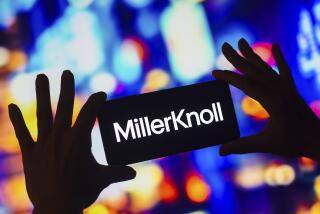Bonus.ly looks to motivate workers with peer-to-peer bonuses
Complainers, excuse peddlers and social loafers. Every company has them. I’m talking about unmotivated employees who hurt not only business but also everyone working around them.
So how do you motivate unmotivated employees? One way is to offer traditional financial incentives such as annual bonuses or employee-of-the-month awards.
A start-up called Bonus.ly aims to change the incentive model, helping companies reward and motivate employees by using peer-to-peer bonuses. It uses a Web platform that offers a different approach to employee recognition, reward and collaboration.
“When workers feel recognized, they will perform better, work harder and are more motivated,” said Raphael Crawford-Marks, who built and co-founded Bonus.ly with his longtime friend and colleague John Quinn.
As the workforce continues to transform into a knowledge economy based on intellectual capital and productivity, employees are encouraged to collaborate and communicate more, “but it’s often neutral (transactional) or negative (as in, ‘where is the report?’),” said Crawford-Marks. He said Bonus.ly helps incentivize positive communication, such as meaningful praise and recognition, through timely peer bonuses and awards focused along company-defined core values.
Here is how it works:
First, employers decide on a bonus budget for the peer recognition program, with the ability for companies to use financial incentives other than hard cash. For example, an airline might use “miles” as its currency. Or a company could use “points” that can be exchanged for prizes or perks.
Once the bonus budget is set, each team member gets a monthly allowance for granting peer bonuses. Employees then reward one another for their work in the form of praise and peer bonuses. The bonuses come in set levels, starting from $20, with increments of 10% of the employee’s total budget. This makes it simple to give bonuses and removes the cognitive load on the user, with the focus on praising colleagues for work they have done well.
Bonus.ly sends a series of emails reminding employees to use their peer-to-peer bonus budget, as it does not roll over to the next month. That helps motivate employees to give recognition and spend their budget.
“The employees competing for peer rewards are motivated by the recognition itself,” Crawford-Marks said, adding that “the praise I give is almost equal to the praise I get from a manager or someone in senior position.”
Employers then pay out employee reward bonus balances. Because the bonuses are given by peers, there is a sense of transparency and employees know exactly why they got the award. Bonus.ly periodically highlights the best employees with special peer awards. The site also analyzes bonus data and provides insights to managers, such as the names of top performers.
Bonus.ly was piloted by Oracle in November. Of the 78 team members involved, 78% engaged in giving and 94% engaged in receiving.
Bonus.ly is currently free and will remain so during its alpha period. After it launches in beta (within the next three months), Crawford-Marks said he plans to charge companies on a per-user basis, starting from $1 or $2 per employee.
ALSO:Start-up Sunday: Virginia Tech victim pitches campus safety app
Start-up Sunday: KillSwitch app wipes out painful reminders on Facebook
Start-up Sunday: Whisper shares information about your favorite subject: You






